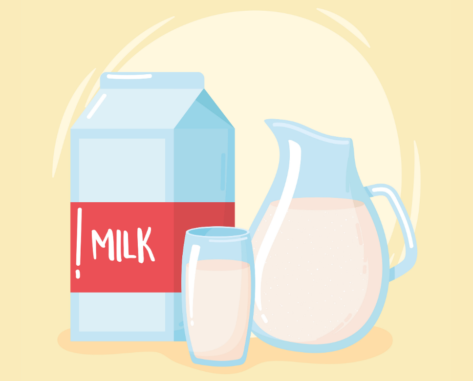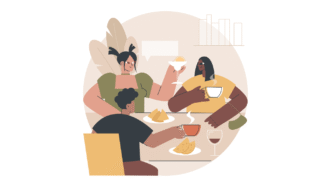LESSON OVERVIEW
In this lesson, students will learn advanced cooking verbs, discuss different types of milk and do an English class project.
LEAD-IN
The worksheet starts with a brainstorming activity for the whole class. Students have to make a list of types of milk they know. Then, they look at the different types of milk on their list and say what kind of people use each type. The second task consists of a few questions about how milk consumption.
COOKING VERBS
This part includes two tasks. First, students read a few sentences and match verbs in bold to correct meanings. In this task, students will learn verbs such as flavour, soak, dilute, drain, rinse, etc. To practise the verbs, students play a game of ‘Noughts and Crosses’. They take turns to choose a square. To ‘win’ the square and draw an ‘O’ or an ‘X’, they explain how the verb can be used with some kind of food (except milk). The winner is the first player to make a row of noughts or crosses in any direction.
VIDEO
Next, students move to two listening comprehension tasks. They watch the first part of a video about plant-based milks and decide whether a few given statements are true or false. Before watching the second part of the video, students have to use their own knowledge and ideas to choose correct options to complete sentences about different types of milk. It is best done in pairs or groups of three or four so they can share their ideas. Then, they watch the second part of the video to check their answers. Finally, they hold a short discussion about the ideas in the video and milk drinking habits.
ENGLISH CLASS PROJECT
The lesson plan ends with an English class project. Students work in pairs or groups. Each group will be given one card with information about a particular type of milk. They have to invent a brand name and a slogan, and design a label for their product. When finished, they present their product to the rest of the class. The activity can also be done individually.
WORKSHEETS
Subscribe to unlock these and many other Standalone lesson with the Premium plan
Subscribe














Very educational
Thanks so much for commenting! We really appreciate getting feedback.
Really enjoying your work, Katherine!
Thank you so much! You’ve made my day.
Dear Katherine,
First of all thanks for the lesson, it is very informative. Still, while using it we came to a disagreement with one of my students who knows much about farming (which I don’t). It is about the numbers used in the lesson – can that be true eg. that 4 square KILOMETERS of land is needed for 1 GLASS of cow milk? And a quarter square KILOMETERS for one glass of soy milk? Isn’t that by any chance 1 square METERS? I really don’t know anything about it, but his reasoning seemed logical and I promised him I would ask you.
Thank you in advance for your answer.
I’m going to butt in and try to clarify that. The data you quote is taken from the video and TED-Ed is known for making sure that their videos include scientifically credible data. Of course, that doesn’t mean we should trust without doubt anything they say. I couldn’t find any precise source of this statistic and what they mean by ‘land use’ per glass of milk – it seems there are several ways of counting that. Nevertheless, what I found seems to show the same ratio in terms of cow milk vs soy milk. Check out these two articles, here and here.
Have used this lesson plan a lot. Thanks so much for posting it.
Thanks for the wonderful topic and class!
There’s a tiny mistake in the last project activity. Not sure if this is the place to report this kind of findings.
Keep up the creative work!
Thanks for the comment! I sent you an email about that mistake you have mentioned.
Fantastic lesson! Thank you for your work!
Glad you enjoyed it! Thanks for leaving a comment 🙂
Thanks a lot!
Thank you!